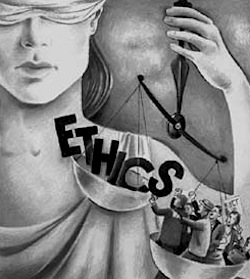Lawyers in the witness box
 Neil Watt •
Neil Watt •  Monday, February 13, 2012
Monday, February 13, 2012 New national solicitors' conduct rules dilute traditional approach to lawyers giving evidence in court for their clients ... Rules that will lead solicitors down the garden path ... Ethical eclipse ... From Neil Watt at the ethics desk
 It feels good for this column to have a home again, and with a wider readership than its old spot in a professional journal north of the Tweed.
It feels good for this column to have a home again, and with a wider readership than its old spot in a professional journal north of the Tweed.
My aim is to challenge and inform - with a focus on the ethics of the legal profession, what it means and how we can do it better.
I'd like this to be an ongoing conversation, so leave comments and if you have an issue you'd like raised, send it through to Justinian and we'll see what we can do.
Now to business ...
In November a solicitor was ordered by the NSW Supreme Court to cease acting for a client in a matter where he had been called to give evidence - Perpetual Trustee Co Ltd v Miller.
The solicitor, Michael Carroll, had continued to act for the client after being called as a witness to contested issues in the same client's case.
Common practice in these situations is to withdraw, unless there are compelling reasons not to. The NSW solicitors' rules say just that:
"Unless there are exceptional circumstances justifying the practitioner's continuing retainer by the practitioner's client, the practitioner must not act, or continue to act, in a case in which it is known, or becomes apparent, that the practitioner will be required to give evidence material to the determination of contested issues before the court."
Most other conduct rules around the country say much the same thing. While it's true that conduct rules are akin to Captain Jack Sparrow's Pirate Code – "they're more of yer guidelines" - they make sense in situations like this and there's plenty of judicial agreement to back them up.
The reason is that lawyers are likely to be caught in a conflict of duties (to the court and client) and probably a conflict of interest too if their own conduct of the matter is under scrutiny.
Like everything in the legal line of business, whether you stay or go all depends on the facts of the matter.
The deciding factor according to Justice Paul Brereton in Mitchell v Burrell is whether the solicitor has a personal stake in the proceedings, particularly if their own reputation is under the gun.
 But this isn't the only conflict that arises in these situations. The solicitor may well be called upon to provide information that is contrary to the interests of the client he is sworn to protect. At the very least the independence of practitioners could be questionable in these situation as their role is confused.
But this isn't the only conflict that arises in these situations. The solicitor may well be called upon to provide information that is contrary to the interests of the client he is sworn to protect. At the very least the independence of practitioners could be questionable in these situation as their role is confused.
As a lawyer the task is to present the client's case and challenge the case of the other side. The role of a witness is to provide sworn testimony about the facts.
It's more than probable that for a lawyer-witness these roles will collide.
There may be rare situations where a lawyer should continue to act, e.g. if withdrawal would cause a grave injustice to the client.
Nonetheless, the web of conflicts likely to arise means that the presumption should be withdrawal, unless there are damn good reasons to remain.
So I would respectfully go a step further than Justice Brereton and agree with former Queensland Chief Justice Walter Campbell, who regarded it ...
"unwise for a solicitor, who is not himself appearing as an advocate ... but who is aware that it is likely that he will be called as a material witness ... to continue, either personally or through his firm, to represent the client if this can be reasonably avoided." (Chapman v Rogers ex parte Chapman [1984] 1 Qd R 542 at 545.)
All of which is virtually lifted from the Queensland and NSW rules.
I'm left to wonder why this important onus has been reversed in the new Australian Solicitors' Conduct Rules (ASCR) 27.2:
"In a case in which it is known, or becomes apparent, that a solicitor will be required to give evidence material to the determination of contested issues before the court the solicitor, an associate of the solicitor or a law practice of which the solicitor is a member may act or continue to act for the client unless doing so would prejudice the administration of justice."
There are at least five problems with this approach:
- The words "prejudice the administration of justice" are ambiguous. Do they mean "unless the solicitor's withdrawal would cause their client a serious injustice"? If so, then the rule should say so.
- This ambiguity will lead to a wide variety of interpretations throughout the country and this is contrary to the purpose of national rules, which is to create national consistency.
- The reversed onus ignores the very conflicts that earlier rules have warned solicitors to avoid. The rules should be creating a sensitivity to conflict not advocating a head in the sand approach to them.
- It does not enhance public confidence in the profession when conduct rules are confused about what a conflict is, nor does it serve the "administration of justice" in spite of its reference to it; and
- It is more likely to lead solicitors into error.
My advice to practitioners is to heed the current NSW Rule 19 and its interstate equivalents over the proposed ASCR 27 (a rule already adopted in South Australia).
The current rule is not a direct prohibition but correctly alerts lawyers that they are now on thin ice and the presumption should be to withdraw, unless there are compelling reasons not to.
The bottom line: If you can't represent a client's interest without other duties or your own interests getting in the way, don't represent them.
I'd value your thoughts ... Until next time, be good.
 Neil Watt established and managed the Queensland Centre for Lawyers' Ethics, created the Australian Lawyers' Ethics website,lectured at the T.C. Beirne School of Law, University of Queensland, and served on the Law Council of Australia's professional ethics committee responsible for drafting the Australian Solicitors' Conduct Rules. He is the principal of Neil Watt Consulting.
Neil Watt established and managed the Queensland Centre for Lawyers' Ethics, created the Australian Lawyers' Ethics website,lectured at the T.C. Beirne School of Law, University of Queensland, and served on the Law Council of Australia's professional ethics committee responsible for drafting the Australian Solicitors' Conduct Rules. He is the principal of Neil Watt Consulting.









Reader Comments